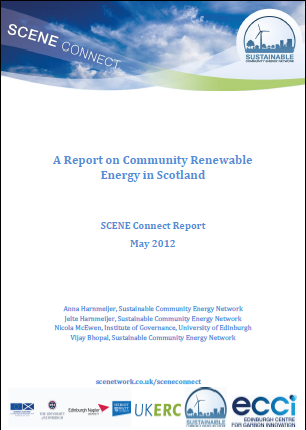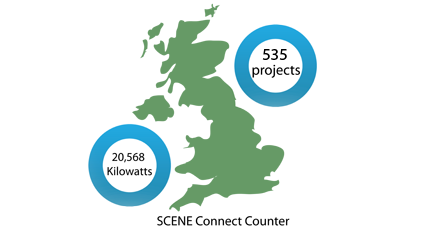Introduction to Financing Options
Introduction to Financing Options
The following headings describe some of the options communities use to help fund their renewable energy projects.
Grant Funding
Public Loan
Private Equity
Commercial Loans
Community Shares
Capital Reserve
Crowdfunding
Grant Funding
A grant is a non-repayable fund disbursed by one party to a recipient, often a non-profit entity, business or individual. Grants are made available in the UK for a specific project or purpose and it will usually only cover part of the costs. The biggest grant distributors are government departments and agencies, which offer grants to third party organisations, to carry out statutory work on their behalf. Grant funding is mainly useful for projects that are still on the drawing board i.e. projects that are being proposed rather than projects that are part of the way through. You need to prepare a detailed description of your project, and, just like a bank, you need to convince the grant giving authority that you are worthy of the money.
Major grant distributors in the UK include the National Lottery and charitable trusts. The Big Lottery Fund, for example, is responsible for distributing around £600 million each year to community groups and projects that improve health, education and the environment. Other grant funds, such as the Local Energy Assessment Fund (LEAF), aims to support communities across England and Wales to prepare for new opportunities in sustainable energy and climate change arising from the Green Deal, Renewable Heat Incentive and Feed in Tariffs.
See our technology and area specific Policy Guidance pages for more information on grants that could be of interest to you.
Public Loan
Public loan schemes involve borrowing from the government in order to get a project going, with the intention of paying the loan back with interest if the project is successfully built. The Scottish Government’s Community and Renewable Energy Scheme (CARES) is a good example of this and it was created to support the development of locally-owned renewable energy projects that provide wider community benefit. The loan finances the pre planning consent stage of project development, a high risk cost which is widely seen as a barrier to community groups and small businesses. The maximum loan is £150,000 per applicant, with a fixed interest rate at 10% p.a.. A write of facility will apply where projects proposed are unable to proceed due to failure at the planning stage.
Community organisations, national/regional organisations and commercial businesses are eligible for the loan. Any potential renewable energy project, joint venture or cluster proposal will be considered and must demonstrate that the local community benefit is maximised. These loans are short term loans to allow prospective developers to work up a project stage where a commercial funder will agree to provide loan finance to build the scheme. The loan is required to be repaid when financial close on the capital scheme is reached.
See our technology and area specific Policy Guidance pages for more information on public loans that could be of interest to you.
Private Equity
As the name implies, private equity is investment in assets that either are not owned publicly or that are publicly owned but with plans to go private. This kind of financing is very broad, and can take on many forms; from investment 'houses' to small groups of people and individuals who wish to invest in businesses and projects. Invetors buy parts of companies and gain a share of that company’s earnings to pay themselves back. Capital for private equity is raised from retail and institutional investors, it is often used in new companies to fund research and development and to provide seeding budgets. Private equity can be utilised by community organisations in renewable energy, often as 'top up' finance to compliment other types of finance.
Commercial Loans
A loan arrangement in which a lender, in this case commercial banks, gives money to a borrower, and the borrower agrees to repay the money, usually along with interest, at some point in the future. Most commercial banks will not lend to non-profit organisations with limited cash flow, although some lenders do specialise in working with community groups. These loans, therefore, are best suited for projects that require larger sums of money. Loans are received from commercial banks such as Charity Bank, Coop Bank and Triodos Bank. Charity Bank lends to community organisations throughout the UK, including renewable energy projects. Triodos Bank has so far provided loans to 210 renewable energy projects.
See our technology and area specific Policy Guidance pages for more information on commercial loans that could be of interest to you.
Community Shares
Community investment is a way of raising money from communities through the sale of shares or bonds in order to finance enterprises serving a community purpose. Community investors can get their money back, and many also receive interest or dividends on the money they invest. Community investment underpinned the growth and development of co-operatives. Co-operatives UK is the national membership organisation for co-operatives of all kinds and aims to promote enterprise, equity and engagement through community shares and bonds.
Community shares are an excellent source of capital investment, as well as a highly effective way of engaging communities in the work of an organisation. Shares convey membership and ownership, a stage that can often be the first step on a ladder of participation leading to far greater levels of involvement in and commitment to the organisation.
Capital Reserve
Capital reserve is a type of account that is reserved for long-term capital investment projects or any other large and anticipated expenses that will be made in the future. This type of reserve fund is set aside to ensure that the company or municipality has adequate funding to at least partially finance a project.
Crowdfunding
Crowdfunding describes the collective cooperation, attention and trust by people who network and pool their money together, usually via the internet, in order to support efforts initiated by other people or organisations. Crowdfunding can replace the need for specialised grant applications or commercial loans with that of a more casual, yet powerful approach based on crowd participation. Crowdfunding is very much related to online communities and social networks. The crowd can already exist as a community but they can also form from disparate groups around the world who all happen to share an interest in funding a project or a campaign.
Websites such as Crowdfunder.co.uk gives you the chance to get involved and fund projects you wish to support. Crowdfunder presents a way to raise money by tapping into a ‘crowd’ of like-minded people willing to invest small amounts of cash in exchange for unique rewards and being part of something new. SCENE Connect hopes to offer crowdfunding opportunities to its members in the near future.




